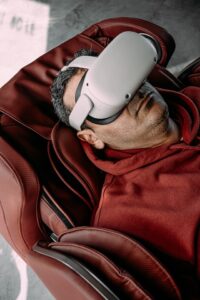At Atmosphaeres, we’re proud to champion the intersection of virtual reality and mental health. The scientific evidence is clear: VR is revolutionizing therapy and mental well-being, and we’re excited to be at the forefront of this movement. Individuals and businesses alike are discovering the benefits of VR, and we are privileged to provide high-quality 360º content that makes this transformation possible.
In an age where mental health challenges are increasingly prevalent, the search for innovative and effective treatments is more critical than ever. Society faces complex mental wellness issues, and technology, particularly virtual reality (VR), offers a viable solution.
Read on to find out how virtual reality can address the current mental health crisis and how 360º VR videos can make a real-world impact.
The Mental Health Crisis in the 2020s
We are witnessing a global mental health crisis, exacerbated in 2020 by the COVID-19 pandemic, following economic instability, and other stress factors. Millions of people across all demographics are affected by rising levels of mental health issues.
The most common mental health disorders include:
- Anxiety
- Depression
- Borderline Personality Disorder (BPD)
- Bipolar Disorder
- Post-Traumatic Stress Disorder (PTSD)
- Binge Eating Disorder
- Obsessive-Compulsive Disorder (OCD)
- Schizophrenia
This surge is attributed to factors like elevated stress, social isolation, and the pervasive impact of unexpected global crises. While traditional treatments such as psychotherapy and medication provide relief for many, they also face limitations like accessibility, stigma, and varied responses to treatment.
Therefore, there is an urgent and growing need for alternative therapies that complement existing treatments and are easily accessible to those who struggle with traditional methods. Enter Virtual Reality (VR)—a technological innovation demonstrating immense potential in bridging the mental health treatment gap.
The Role of Virtual Reality in Therapy
VR therapy uses immersive environments to simulate situations tailored to address specific mental health issues. This controlled setting allows individuals to confront fears, practice coping strategies, and explore therapeutic scenarios with professional guidance.
The power of VR as a therapeutic tool lies in its ability to create a sense of presence, making users feel truly “inside” the virtual environment. This immersive quality is particularly beneficial for:
- Burnout prevention
- Stress reduction
- Meditation
- Mindfulness
Moreover, VR is being used in the treatment of depression, providing immersive experiences that promote relaxation, mindfulness, and positive mood enhancement. Research shows that VR effectively reduces symptoms of depression and anxiety, serving as a valuable complement to traditional therapies.
At Atmosphaeres, we’re committed to leveraging the transformative potential of VR to improve mental well-being. Explore with us how 360º VR videos can contribute to a healthier, happier world.

Expand Therapy Accessibility with VR
VR’s potential goes far beyond individual therapy sessions. It presents a scalable solution to reach people in remote or underserved areas, granting access to mental health resources that might otherwise remain out of reach. With continuous advancements in VR technology, accessibility and affordability are swiftly improving, making it a practical option for a wider audience.
The Power of 360º Virtual Nature in Mental Health Therapy
When it comes to mental health therapy, immersing oneself in virtual natural environments is a groundbreaking approach. This method combines the tranquility of nature with the accessibility of digital technology. 360 VR video production companies like Atmosphaeres are leading the charge, crafting 360º videos that transport users to serene landscapes, from lush forests to calm beaches.
Below are some of the therapeutic benefits of virtual nature, illustrating how these digital experiences can foster mental well-being and aid in the treatment of various mental health conditions:
Escaping to Serenity
Virtual natural environments offer an immediate escape from the stressors of daily life, providing a sanctuary for the mind to rest and rejuvenate. These peaceful settings create a profound sense of presence, which has been shown to reduce stress and improve mood.
Enhancing Mindfulness and Relaxation
Engaging with virtual nature enhances mindfulness practices and relaxation techniques. This focused attention helps to anchor the mind in the present moment, a core aspect of mindfulness that has proven therapeutic benefits, including reducing symptoms of stress and depression.
Positive Mood Hack
The beauty and tranquility of virtual nature directly impact a person’s mood. Studies have demonstrated that exposure to natural environments, even digitally, can elevate mood and increase feelings of happiness and well-being. For individuals dealing with depression or stress, virtual nature can be a powerful tool in their therapeutic arsenal, offering a safe and accessible way to experience the mood-boosting effects of nature.
Accessibility and Scalability of Therapy with VR Nature
One of the most significant advantages of virtual reality nature experiences is their accessibility. For individuals living in urban areas, those with physical disabilities, or anyone unable to access natural settings, virtual reality offers a practical solution. Furthermore, as VR technology becomes more affordable and widespread, these therapeutic nature experiences can reach a broader audience, ensuring that the healing power of nature is available to all, regardless of location or circumstance.

Photo from Vinicius “amnx” Amano at Unsplash
Challenges and Considerations with VR Therapy and Mental Health Treatment
Virtual reality (VR) offers promising advancements in mental health, yet integrating it as a therapeutic tool brings several challenges and considerations. Addressing these issues is paramount for the safe and effective use of VR in mental health treatment.
Technological Accessibility and Affordability
A key challenge is the accessibility and affordability of VR technology. Despite decreasing costs, VR equipment and compatible software can still be prohibitive for some individuals and institutions. Ongoing efforts aim to make VR more accessible through the development of affordable hardware and software solutions.
User Comfort and Safety
VR experiences can significantly vary among individuals. Some may face discomfort, such as motion sickness, disorientation, or temporary visual impairments. Ensuring user comfort and safety involves the careful design of VR experiences, including high-quality production, user-friendly interfaces, customizable settings, and providing clear instructions and support.
Privacy and Data Security
Using VR in therapy raises important questions about privacy and data security. Sensitive personal and health information may be collected during VR sessions, necessitating stringent data protection measures. Healthcare providers and VR developers must adhere to privacy laws and regulations to ensure data is securely stored and transmitted.
Professional Training and Standards
Incorporating VR into therapeutic practices requires specialized training for mental health professionals. Therapists need to be proficient in the technical aspects of VR and understand its applications and limitations within a therapeutic context. Establishing professional standards and guidelines for using VR in therapy is essential to ensure its effective and ethical application.
Given the immersive nature of VR, the visual and auditory fidelity of the content is crucial for maintaining the therapeutic ambiance and ensuring patient engagement. At Atmosphaeres, we are dedicated to providing top-quality therapeutic VR videos ready to license in different resolutions.
Put your headset on and try it out!
The Future of VR in Mental Health
Despite existing challenges, the future of VR in mental health is promising. Advancements in technology and research are expanding VR’s capabilities as a tool for treating mental health conditions.
Expanded Therapeutic Applications
While our current content excels in reducing stress and enhancing motivation and relaxation, researchers are exploring new therapeutic applications for VR. These include treatments for eating disorders, addiction, and chronic pain. As we deepen our understanding of VR’s potential, it will likely become an integral component of holistic mental health care.
Integration with Traditional Therapies
VR will be increasingly integrated with traditional therapeutic practices. By combining VR with established methods such as cognitive-behavioral therapy, therapists can offer a more comprehensive treatment approach tailored to individual client needs.
Emphasis on Personalization
Future VR developments will likely focus on enhancing the personalization of therapeutic experiences. AI-driven algorithms could customize virtual environments and scenarios based on the specific preferences and therapeutic goals of each user, thereby increasing the efficacy of VR as a treatment tool.
Broader Accessibility for Home Use
Efforts to make VR technology more affordable and accessible will continue, aiming to democratize access to this therapeutic tool. This includes reducing the cost of VR hardware and developing intuitive software compatible with a wide range of devices.
Through continuous innovation, research, and collaboration between technologists and mental health professionals, VR is poised to play a significant role in future mental health care, providing new avenues for healing and well-being.
Conclusion
The integration of VR into mental health treatment presents both challenges and immense potential. As technology advances and becomes more embedded in therapeutic practices, VR promises to transform mental health care. It offers innovative, personalized, and accessible support, contributing significantly to addressing mental health issues.
To learn more about how VR improves lives, visit our blog for detailed insights into this evolving field.
 RSS - Posts
RSS - Posts
Leave a Reply